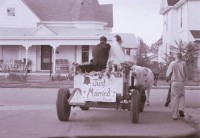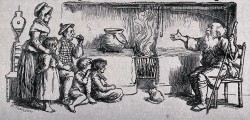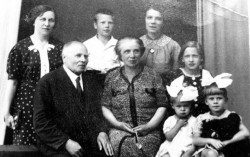Apr 2017
Proof is Possible
In her 2008 National Genealogical Society Quarterly article called “The Myth of Impossible Proof: Modern Genealogy Methods and a Holocaust Fraud,” author Sharon E. Sergeant wrote “Researchers always fail when they believe proof is impossible or when difficulties stop them from persisting.”[1] Every genealogical research problem comes with a set of complications. Sources may not […]
Apr 2017
Are You Researching Through a Peephole?
We’ve probably all used peepholes to peek out and see who is knocking at the door. The tiny opening gives a glimpse, but it isn’t large enough to provide the full picture. If the visitor is too close, off to the side, or looking down, there’s a good chance we won’t be able to see much. […]
Mar 2017
Writing Family Narratives
Exceptionally well-written family narratives inspire others to try to bring their own ancestors to life in the same way. It sometimes seems, however, that talented writers are born with a gift—that either a person has or doesn’t have talent. Having talent certainly helps, but everyone can improve their writing ability. Just as genealogists spend time […]
Mar 2017
Second Looks, Second Chances
People often say to themselves, “If I only knew then what I know now.” They look wistfully at past experiences thinking that if they had another chance they might do things differently. In most cases, people can’t redo yesterday. But in genealogical research, we sometimes can—and should—do just that. Second looks are often needed before […]
Feb 2017
Correlation and Validation
Eureka! You’ve found the record you’ve been looking for. It’s right where you expected it to be. The names, dates, places, and situations are consistent with the people you’re researching. You’re tempted to celebrate, thinking you have the information you need. But you’re a responsible researcher. And responsible researchers don’t celebrate based upon something found […]
Feb 2017
Thinking About How Couples Met
In 1898, the sensationalist New York American reported the story of an unusual engagement. A Polish man from Pennsylvania had approached a New York City saloonkeeper and offered to pay him $20 for his help in finding the man a wife. The immigrant requested that for the same $20 the saloonkeeper host a party—complete with […]
Jan 2017
Resolutions, Goals, and Objectives
It’s January—the first month of a new year. This is the time when people tend to think about clean slates and a fresh starts. They make resolutions and set objectives. If you’re a member of the National Genealogical Society, at least some of those objectives likely relate to genealogy. Most people express their resolutions as […]
Jan 2017
Creativity in Genealogical Research
Genealogists’ work is grounded in sources—in records, artifacts, images, traditions, and other items that provide information used as evidence. But sources and the information they provide are only part of any given solution to a problem. Skilled, knowledgeable, determined researchers go beyond the obvious facts found in sources. They capitalize on what the sources say […]
Dec 2016
Family Tradition as a Source
Most genealogists probably encounter family traditions. They’re the stories—often with uncertain origins—that have been passed down from one generation to the next. The tales may involve subjects such as ethnicity, places of origin, military exploits, occupations, accomplishments, connections to famous people, and so on. Can we use family traditions as sources? Absolutely! As Thomas W. […]
Dec 2016
Learning from NGS Family History Writing Competition Winners
Each year the National Genealogical Society holds a Family History Writing competition. The winning entry is submitted to the NGS Quarterly editors for possible publication. When accepted, NGS Quarterly readers benefit, for the contest winners’ work demonstrates excellence in researching and writing family histories. Kay Haviland Freilich’s “Verifying an Ancestor’s Words: The Autobiography of Mary […]









